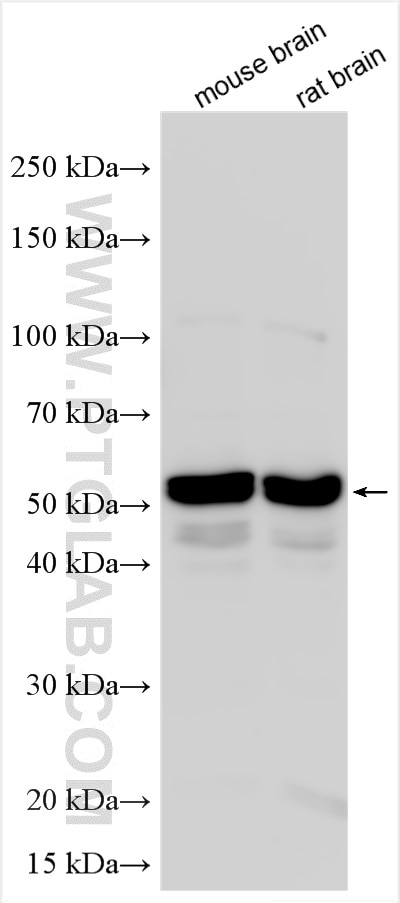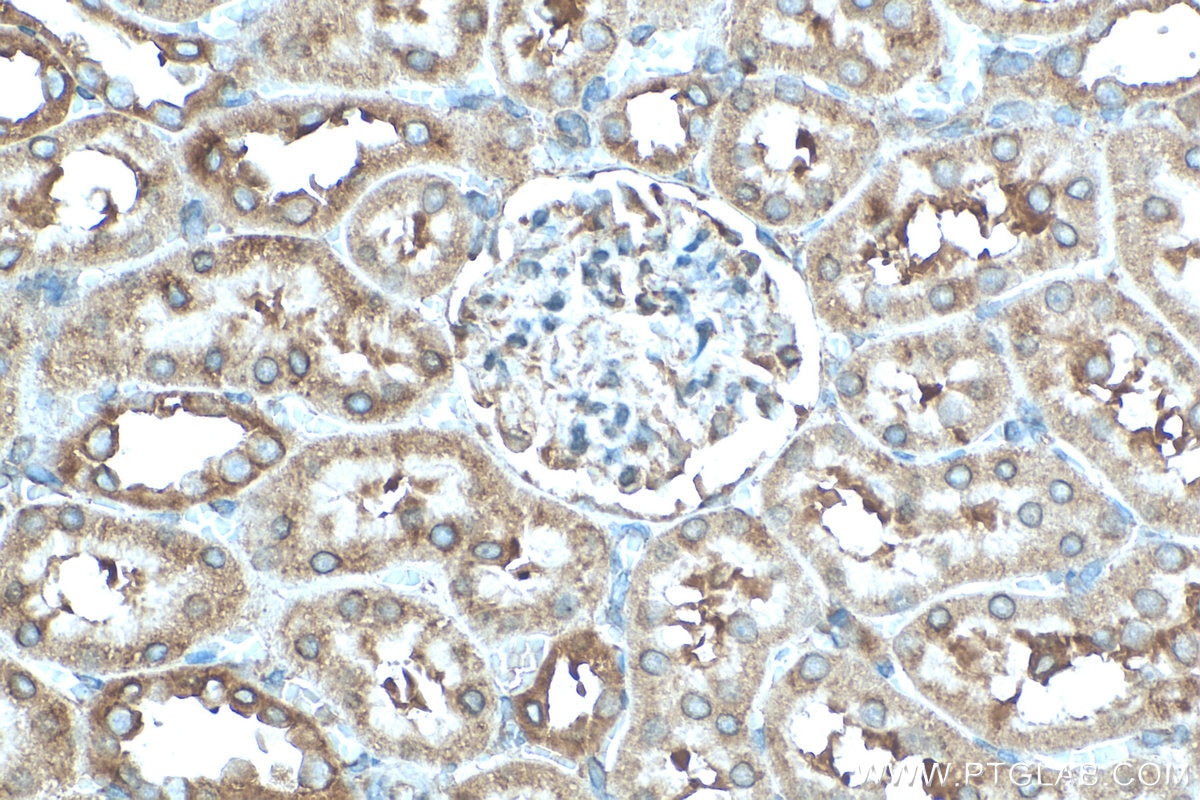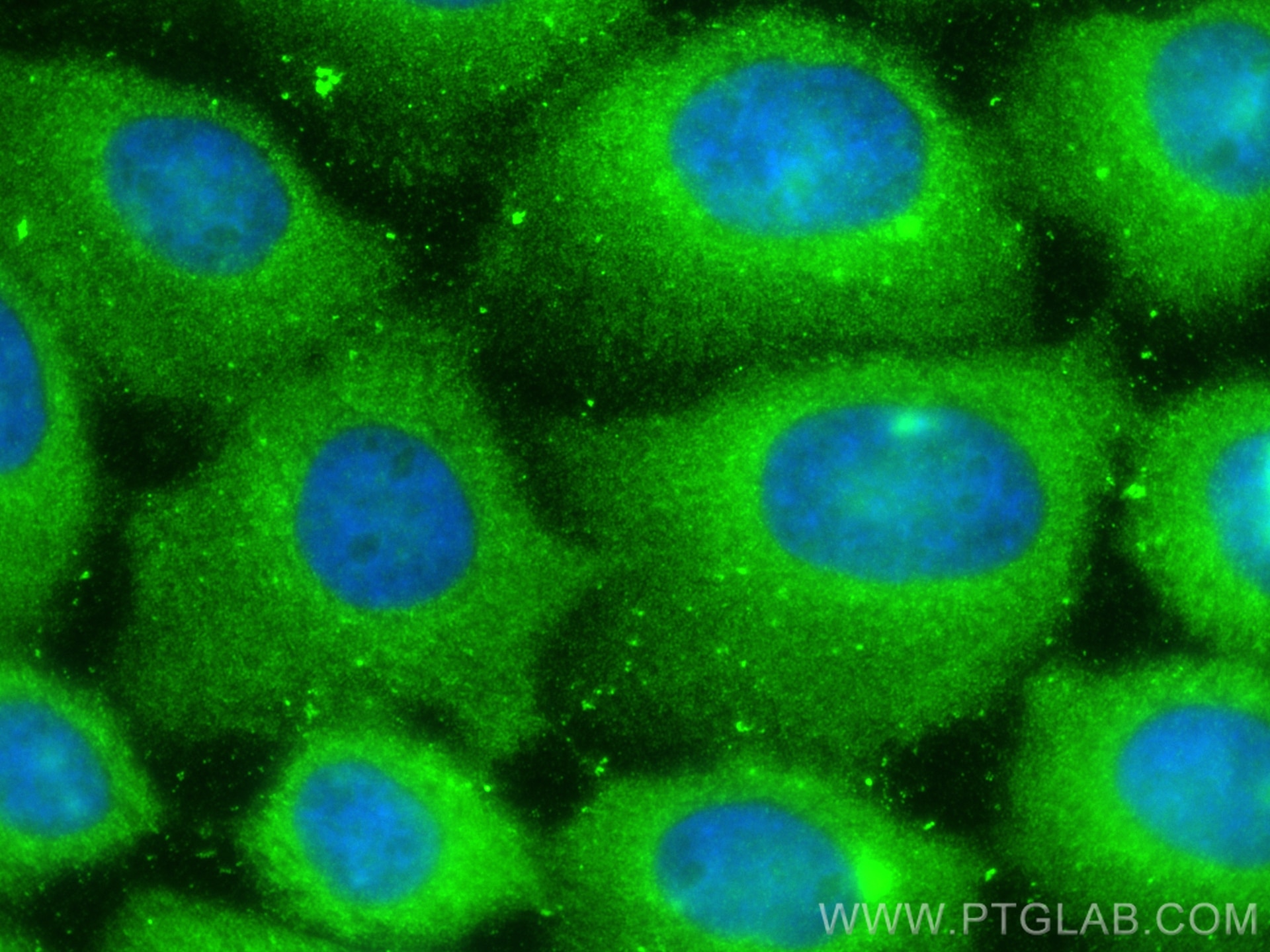Tested Applications
| Positive WB detected in | mouse brain tissue, rat brain tissue |
| Positive IHC detected in | rat kidney tissue Note: suggested antigen retrieval with TE buffer pH 9.0; (*) Alternatively, antigen retrieval may be performed with citrate buffer pH 6.0 |
| Positive IF/ICC detected in | A431 cells |
Recommended dilution
| Application | Dilution |
|---|---|
| Western Blot (WB) | WB : 1:500-1:3000 |
| Immunohistochemistry (IHC) | IHC : 1:50-1:500 |
| Immunofluorescence (IF)/ICC | IF/ICC : 1:200-1:800 |
| It is recommended that this reagent should be titrated in each testing system to obtain optimal results. | |
| Sample-dependent, Check data in validation data gallery. | |
Published Applications
| KD/KO | See 1 publications below |
| WB | See 1 publications below |
| IP | See 1 publications below |
Product Information
11434-1-AP targets STK32C in WB, IHC, IF/ICC, IP, ELISA applications and shows reactivity with human, mouse, rat samples.
| Tested Reactivity | human, mouse, rat |
| Cited Reactivity | human, mouse |
| Host / Isotype | Rabbit / IgG |
| Class | Polyclonal |
| Type | Antibody |
| Immunogen |
CatNo: Ag1960 Product name: Recombinant human STK32C protein Source: e coli.-derived, PGEX-4T Tag: GST Domain: 1-422 aa of BC015792 Sequence: KKRMGSSMSAATARRPVFDDKEDVNFDHFQILRAIGKGSFGKVCIVQKRDTEKMYAMKYMNKQQCIERDEVRNVFRELEILQEIEHVFLVNLWYSFQDEEDMFMVVDLLLGGDLRYHLQQNVQFSEDTVRLYICEMALALDYLRGQHIIHRDVKPDNILLDERGHAHLTDFNIATIIKDGERATALAGTKPYMAPEIFHSFVNGGTGYSFEVDWWSVGVMAYELLRGWRPYDIHSSNAVESLVQLFSTVSVQYVPTWSKEMVALLRKLLTVNPEHRLSSLQDVQAAPALAGVLWDHLSEKRVEPGFVPNKGRLHCDPTFELEEMILESRPLHKKKKRLAKNKSRDNSRDSSQSENDYLQDCLDAIQQDFVIFNREKLKRSQDLPREPLPAPESRDAAEPVEDEAERSALPMCGPICPSAGSG Predict reactive species |
| Full Name | serine/threonine kinase 32C |
| Calculated Molecular Weight | 486 aa, 55 kDa |
| Observed Molecular Weight | 43-55 kDa |
| GenBank Accession Number | BC015792 |
| Gene Symbol | STK32C |
| Gene ID (NCBI) | 282974 |
| RRID | AB_2196626 |
| Conjugate | Unconjugated |
| Form | Liquid |
| Purification Method | Antigen affinity purification |
| UNIPROT ID | Q86UX6 |
| Storage Buffer | PBS with 0.02% sodium azide and 50% glycerol, pH 7.3. |
| Storage Conditions | Store at -20°C. Stable for one year after shipment. Aliquoting is unnecessary for -20oC storage. 20ul sizes contain 0.1% BSA. |
Background Information
STK32C (Serine/Threonine Kinase 32C) is a member of the AGC family of serine/threonine protein kinases. STK32C is overexpressed in various cancers, including bladder cancer and prostate cancer. In bladder cancer, high expression of STK32C is associated with poor clinical outcomes and short relapse-free survival (PMID: 30359551).
Protocols
| Product Specific Protocols | |
|---|---|
| IF protocol for STK32C antibody 11434-1-AP | Download protocol |
| IHC protocol for STK32C antibody 11434-1-AP | Download protocol |
| WB protocol for STK32C antibody 11434-1-AP | Download protocol |
| Standard Protocols | |
|---|---|
| Click here to view our Standard Protocols |








